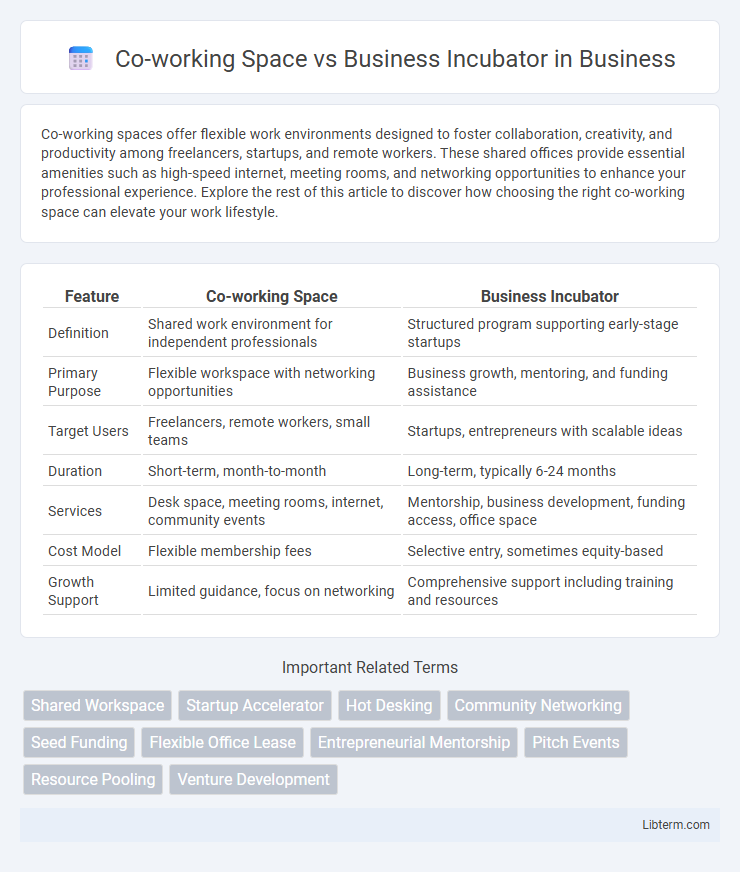Co-working spaces offer flexible work environments designed to foster collaboration, creativity, and productivity among freelancers, startups, and remote workers. These shared offices provide essential amenities such as high-speed internet, meeting rooms, and networking opportunities to enhance your professional experience. Explore the rest of this article to discover how choosing the right co-working space can elevate your work lifestyle.
Table of Comparison
| Feature | Co-working Space | Business Incubator |
|---|---|---|
| Definition | Shared work environment for independent professionals | Structured program supporting early-stage startups |
| Primary Purpose | Flexible workspace with networking opportunities | Business growth, mentoring, and funding assistance |
| Target Users | Freelancers, remote workers, small teams | Startups, entrepreneurs with scalable ideas |
| Duration | Short-term, month-to-month | Long-term, typically 6-24 months |
| Services | Desk space, meeting rooms, internet, community events | Mentorship, business development, funding access, office space |
| Cost Model | Flexible membership fees | Selective entry, sometimes equity-based |
| Growth Support | Limited guidance, focus on networking | Comprehensive support including training and resources |
Introduction: Defining Co-working Spaces and Business Incubators
Co-working spaces are shared work environments designed to provide flexible office solutions, fostering collaboration among freelancers, startups, and remote workers. Business incubators are structured programs that support early-stage startups with resources such as mentorship, funding access, and business development services to accelerate growth. Both entities support entrepreneurship but differ significantly in scope, purpose, and resource allocation.
Core Differences Between Co-working Spaces and Incubators
Co-working spaces primarily provide flexible, shared office environments that foster collaboration among independent professionals and startups without offering structured business support. Business incubators deliver comprehensive services, including mentorship, funding access, and tailored business development programs designed to accelerate early-stage company growth. The core difference lies in co-working spaces facilitating a collaborative workspace, while incubators actively nurture startups through strategic resources and guidance.
Target Audience: Who Uses Each Model?
Co-working spaces primarily attract freelancers, remote workers, startups, and small businesses seeking flexible work environments with shared amenities and networking opportunities. Business incubators target early-stage startups and entrepreneurs aiming for intensive support, including mentorship, funding access, and structured growth programs. Both models serve innovation-driven professionals but differ in the level of resources and long-term development focus offered to their users.
Services and Resources Provided
Co-working spaces offer flexible workstations, high-speed internet, meeting rooms, and a collaborative environment designed for freelancers, startups, and remote workers. Business incubators provide comprehensive support including mentorship, access to funding, business development resources, and networking opportunities tailored to early-stage startups aiming for growth. While co-working spaces focus on workspace and community, incubators emphasize structured guidance and resource access to accelerate business success.
Community, Networking, and Collaboration Opportunities
Co-working spaces offer vibrant communities where freelancers and startups engage in daily networking, fostering organic collaborations through shared work environments. Business incubators provide structured support with mentorship programs and access to investor networks, enhancing strategic partnerships and resource sharing. Both environments promote collaboration, but incubators focus more on accelerating business growth while co-working spaces emphasize flexible community-driven interactions.
Funding and Investment Support
Business incubators offer structured funding opportunities and access to venture capital through their extensive investor networks, providing startups with crucial financial support during early stages. Co-working spaces primarily provide flexible work environments with limited direct funding, focusing instead on community and collaboration among entrepreneurs. Investment support in incubators often includes mentorship on pitch development and grant applications, enhancing startups' chances of securing capital.
Cost Structure and Membership Models
Co-working spaces typically offer flexible, pay-as-you-go membership models with monthly fees ranging from $100 to $700, focusing on shared amenities and open seating plans that reduce upfront costs. Business incubators usually provide structured programs with graduated membership tiers, combining workspace with mentorship and access to funding, often requiring equity stakes or fixed fees averaging $500 to $2,000 per month. The cost structure of co-working centers on operational expenses while incubators integrate additional value-added services, creating higher but potentially more strategic investments for startups.
Flexibility and Commitment Levels
Co-working spaces offer high flexibility with short-term memberships and no long-term commitments, allowing entrepreneurs to scale usage based on immediate needs. Business incubators typically require longer commitment periods but provide structured support, mentorship, and access to resources designed for startup growth. The choice between them hinges on balancing the desire for flexible workspace access against the need for comprehensive developmental support.
Industry Focus and Specialization
Co-working spaces offer flexible work environments catering to a broad range of industries, providing shared office amenities without specific sector specialization. Business incubators emphasize industry focus by nurturing startups within targeted sectors like technology, biotech, or creative industries, offering tailored mentorship and resources. This specialization supports deeper industry expertise and network development essential for early-stage business growth.
Choosing the Best Option for Your Startup or Business
Choosing the best option for your startup involves evaluating Co-working Spaces and Business Incubators based on your business needs. Co-working spaces offer flexible, cost-effective office solutions ideal for networking and collaboration among diverse professionals. Business incubators provide structured support like mentorship, funding opportunities, and access to industry experts, making them optimal for early-stage startups seeking growth acceleration.
Co-working Space Infographic

 libterm.com
libterm.com